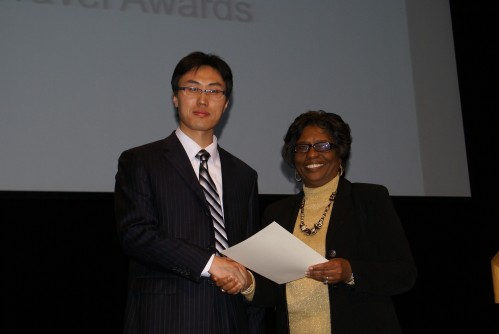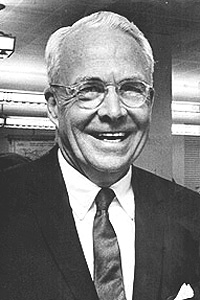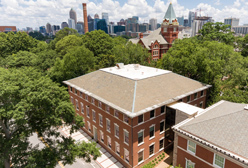New Sponsored Research
The Southface Energy Institute has awarded Marilyn Brown, professor in the School of Public Policy, $32,000 for the development of a "Southface Advocacy Capacity Program."
The National Science Foundation has awarded Julia Melkers, associate professor in the School of Public Policy, $189,031 in additional funding for "Breaking through the Reputational Ceiling: Professional Networks as a Determinant of Advancement, Mobility, and Career Outcomes for Women and Minorities in STEM," bringing the project total to $1.37 million.
The European Commission in Brussels has awarded Alasdair Young, associate professor in The Sam Nunn School of International Affairs, $46,785.60 for The European Union in Global Technology Governance project.
Recent Books by Faculty
The Nuclear Renaissance and International Security (Stanford University Press, 2013) edited by Adam Stulberg, associate professor, The Sam Nunn School of International Affairs, with Matthew Fuhrmann presents analysis from leading experts on the tradeoffs associated with nuclear energy and puts the nuclear renaissance in historical context, evaluating both the causes and the strategic effects of nuclear energy development.
What Does Georgia Tech Think?
Selected Press for Ivan Allen College of Liberal Arts
|
Nunn Awarded German Order of Merit
“It is in Germany’s interest to honor and strengthen in his actions a man who beyond any ideology has worked on and will continue to work on a balancing of the forces needed to secure peace in Europe and has thereby become a powerful advocate for German foreign and security policy interests," reports the German Embassy as it awarded Sam Nunn, professor in The Sam Nunn School of International Affairs, the Knight Commander’s Cross of the Order of Merit. Source: German Embassy, February 1, 2013
Goodman on Cybersecurity
“If an attacker is part of your organization as an outsource contractor – writing code, or building the chip – they are in effect insiders with all kinds of advantages that enable them to cause you and your customers all kinds of grief," says Seymour Goodman, professor in The Sam Nunn School of International Affairs. Source: The Christian Science Monitor, January 30, 2013
|
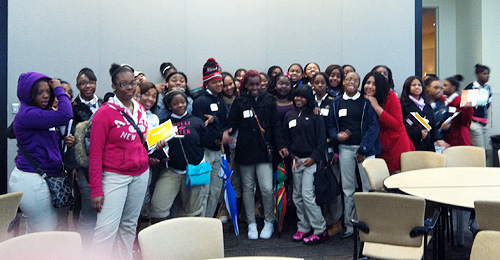
|
Westside Initiative Brings Middle School Students to Campus
The Westside Communities Initiative led by Ivan Allen College and the College of Architecture continued building partnerships with neighborhoods bordering Georgia Tech’s campus this month by bringing nearly 50 middle school girls interested in math and science to campus.
Organized by IAC Westside Community Alliance (WCA) liaison Sheri Davis-Faulkner and coordinator Mackenzie Madden with partners from the InGirls organization, the goal was to increase college acceptance rates among underserved female students.
Eighth-grade students from Joseph Emerson Brown Middle School in West End and John F. Kennedy Middle School in Vine City were welcomed by IAC students Nettrice Gaskins (LMC) and Danielle Sharpe(HTS), and Cecili Reid (CS),for morning activities.
Some of the teens attended classes in the School of Economics and School of Literature, Media, and Communication. Others attended robotics, public participation, and augmented reality demonstrations in the GVU (Graphics, Visualization, and Usability) Center, while others visited a recording studio for LMC faculty member Brian Magerko's EarSketch project. Teens ate lunch in the Presidential Suite of the Bill Moore Student Success Center overlooking the football stadium while Chris Briggs of the Office of Admissions discussed how to prepare for admittance to Georgia Tech.
Student volunteers from IAC Ambassadors,IAC Student Advisory Board, Delta Sigma Theta, FirstGen, JumpStart, OMED, and select Georgia Tech courses led the teens on informal tours of campus and provided the girls an opportunity to ask questions in a smaller setting and provide contact information for future questions about the college experience.
The girls left excited about the prospect of attending Georgia Tech. WCA looks forward to an ongoing relationship with the InGirls program to ultimately increase admittance by students from our neighboring communities.
|
HTS Tuning History Education for our Times
Gregory Nobles and Steve Usselman, professors in the School of History, Technology, and Society (HTS,) have joined a national effort aimed at evaluating and harmonizing the college history major. Sponsored by the American Historical Association (AHA), the project utilizes a process known as "Tuning." Nobles serves on the executive committee, and Usselman is a faculty advisor for the project.
In addition to defining the core elements of historical study, the Tuning project seeks to identify what a student should understand and be able to do after completing a history degree program. Developed by European institutions seeking to integrate their curricula following unification, the approach looks to articulate the underlying purposes of a program of study. Rather than focusing merely on content such as dates and names, Tuners stress how historical study develops analytical abilities and communication skills, while also preparing students for lifelong civic engagement. Students, instructors, and potential employers gain a greater appreciation of why and how history is important.
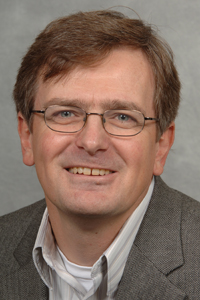 At the recent national meeting of the Association of American Colleges and Universities, held in Atlanta in January, Usselman participated in a panel sponsored by the AHA and offered insights on the Tuning project. Usselman, chair of HTS, also examined the role of clusters and minors, which provide opportunities for non-majors to experience Ivan Allen College's unique brand of historical inquiry. In February, Usselman and Nobles will attend a workshop in Washington sponsored by the AHA. Nobles is a former HTS chair and now directs Georgia Tech’s Honors Program. At the recent national meeting of the Association of American Colleges and Universities, held in Atlanta in January, Usselman participated in a panel sponsored by the AHA and offered insights on the Tuning project. Usselman, chair of HTS, also examined the role of clusters and minors, which provide opportunities for non-majors to experience Ivan Allen College's unique brand of historical inquiry. In February, Usselman and Nobles will attend a workshop in Washington sponsored by the AHA. Nobles is a former HTS chair and now directs Georgia Tech’s Honors Program.
The AHA is the first national professional organization in the United States to embrace Tuning, and HTS is one of sixty participants selected from more than 130 applicants. Georgia Tech is of particular interest to the AHA because the HTS major is interdisciplinary. Students combine the study of history with coursework in sociology, sometimes in team-taught courses. The AHA also found intriguing how the school’s courses simultaneously serve HTS majors and provide social science electives for students in fields such as engineering and the sciences.
|
School of Economics and CISTP Host Terrorism Roundtable
|
|
Prominent experts in terrorism attended a research roundtable titled “Multi-disciplinary Studies on Terrorism.” The roundtable was hosted by the School of Economics and the Center for International Strategy, Technology, and Policy (CISTP) on February 15, 2013. Faculty and experts presenting their research included: - Erica Briscoe, research scientist at GTRI
- Shatakshee Dhongde, assistant professor in the School of Economics
- Jenna Jordan, assistant professor in The Sam Nunn School of International Affairs
- Anthony Lemieux, associate professor at Georgia State University
- Todd Sandler, professor at the University of Texas at Dallas
After the roundtable, Sandler gave a talk titled “Reevaluating terrorism and economic growth: dynamic panel analysis and cross-sectional dependence.” Many Georgia Tech students and faculty attended the lecture. Sandler is an internationally renowned expert on terrorism. His research has appeared in leading journals in economics and political science, and he has authored or co-authored twenty-one books. He has served on numerous editorial boards and has been a consultant to several international organizations including the United Nations Development Program and the World Bank. His visit to Georgia Tech was co-sponsored by the School of Economics and the Center for International Strategy, Technology, and Policy (CISTP). |
Bankoff Named to Georgia Foreign-Trade Zone Board
Joe Bankoff, chair of The Sam Nunn School of International Affairs, has been named to the board of the Georgia Foreign-Trade Zone (GFTZ).
"He will be a real asset as we continue our momentum in ensuring that the Foreign-Trade Zone program is utilized fully by businesses in our state,” said GFTZ President and CEO Julie Brown.
A Foreign-Trade Zone is a federally designated site where companies can import goods or components with lower duties and quicker processing times. The Georgia Foreign-Trade Zone administers an area in Atlanta that starts at Hartsfield-Jackson Atlanta International Airport and extends out to industrial sites throughout the metro area.
"I’m honored to join this select group of directors focused on economic development and international trade interests in Georgia,” said Bankoff.
Related links:
|
Mitchell Appointed to National Academies Committee
|
|
Helena Mitchell, executive director at the Center for Advanced Communications Policy in the School of Public Policy, has been appointed to the National Academies Committee on Geotargeted Disaster Alerts and Warnings. The committee is a part of the National Research Council's Computer Science and Telecommunications Board. Mitchell will spend the next year assisting the committee in organizing a workshop to examine current knowledge and research on geotargeted disaster alerts and warnings to improve the effectiveness of alerts and warnings with greater geographical precision. A summary of the workshop will be published by the National Academies Press. |
Best Appointed to AAAS Committee
|
|
Michael Best, associate professor in The Sam Nunn School of International Affairs, has been appointed to the National Conference of Lawyers and Scientists (NCLS,) a joint committee of the American Association for the Advancement of Science (AAAS) and the American Bar Association's (ABA) Section of Science and Technology Law. NCLS was established in 1974. The committee has fourteen members, half appointed by AAAS and half appointed by the ABA. The appointment serves as an opportunity to engage meaningfully at the intersection of science and technology and in matters of both domestic and foreign affairs. Committee goals include monitoring and examining emerging public policy issues of concern to lawyers, judges, scientists, and engineers. |
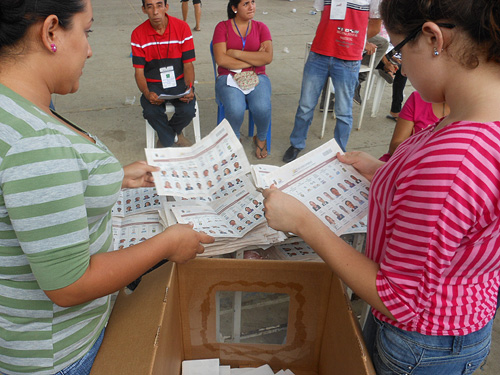
|
Lincoln Serves as Election Observer in Ecuador
Jennie K. Lincoln, part-time professor in The Sam Nunn School of International Affairs, served as an International Election Observer during Ecuador's national elections on February 17, 2013.
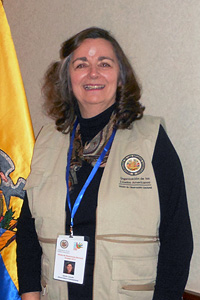 "Election observers wear identifying vests or tshirts; carry clipboards, not weapons; and rely upon training in both social science research methods and computer science to present a final analysis of the electoral process to the host country’s government," said Lincoln of the role. "Election observers wear identifying vests or tshirts; carry clipboards, not weapons; and rely upon training in both social science research methods and computer science to present a final analysis of the electoral process to the host country’s government," said Lincoln of the role.
Lincoln was invited by the Secretary-General of the Organization of American States (OAS) to participate with more than 65 other observers from 20 countries in the Ecuador elections. The purpose of the mission was to observe the administration of the elections throughout the country and to report compliance with international standards of “impartial, transparent, and reliable” election processes.
Lincoln has participated in 13 election observer missions, including eight with former President Jimmy Carter. She first served as an observer in Panama in 1989 when she was the Associate Director for the Latin American Program at the Carter Center.
|
Black Science Fiction Film Festival Explored Negative Images in Media
(Image from Attack the Block, Studio Canal productions, 2011.)
Independent filmmakers, fantasy writers, and science fiction critics gathered to discuss “The State of Black Science Fiction in Film” at an event moderated by Lisa Yaszek, professor in the School of Literature, Media, and Communication (LMC), and organized by the State of Black Science Fiction Collective on February 7, 2013.
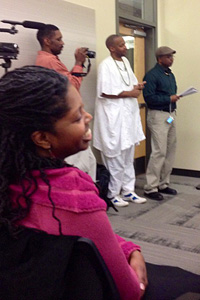 Film screenings included work by local and international filmmakers as well as Clayton Ziga, a student studying Science, Technology, and Culture in LMC. Film screenings included work by local and international filmmakers as well as Clayton Ziga, a student studying Science, Technology, and Culture in LMC.
Following the film screenings, a panel of experts in Black science fiction discussed “Countering Negative Images of Black People in the Media.” The panel was moderated by Balogun Ojetade and Milton Davis of the collective and included the following experts:
- Tommy Bottoms, producer of the urban vampire thriller Eternal
- Terésa Dowell-Vest, creator of the science fantasy action film Genesis: New American Superheroes
- Donnie Leapheart, creator of the science fiction thriller Osiris: The Series
- Bree Newsome, creator of the horror masterpiece Wake
- Steve Barnes, author of The Locusts (Hugo Award nominee)
Related links:
|
Identifying trends and customs in 60 years of Academy Awards speeches
Who is most likely to cry at the Academy Awards? Does everyone actually thank the Academy, or does it just seem like they do? Which person is more popular than God at the Oscars? Georgia Tech master’s student Rebecca Rolfe (Digital Media) found those answers and more while analyzing 60 years of Academy Awards acceptance speeches as part of a research project that focused on gratitude.
Rolfe watched more than 200 speeches from 1953, the first year the awards ceremony was televised, to 2012, and has outlined the trends and patterns on an interactive website. She has also determined the anatomy of an Academy Awards speech, or at least the one that winners tend to give.
Rolfe focused on five categories: actor/actress in a leading role, actor/actress in a supporting role and best director. Because the Academy of Motion Picture Arts and Sciences hasn’t posted every video on its YouTube channel, Rolfe was able to watch 207 of the 300 speeches since 1953.
While every speech is unique, Rolfe noticed a certain pattern that is used by winners.
“Winners tend to start their speeches broadly by thanking the Academy or fellow nominees, then gradually make it more personal,” Rolfe said. “After reflecting on the win’s significance, they typically thank their peers, colleagues and sometimes even their lawyer before mentioning family.”
Nearly every speech (79 percent) closes with some version of “thank you.”
I’d like to thank the Academy… is one of the most famous phrases in Oscar history, but less than half of the winners (40 percent) actually say it.
Unsurprisingly, leading actresses are almost twice as likely to cry than leading actors. However, crying is a recent trend. Seventy one percent of tears have been shed since 1995, including 12 of the last 15 best actresses. Rolfe can only guess why.
“Much like the movies, acceptance speeches are a type of performance,” she says. “I believe the tears are real, but perhaps, maybe even subconsciously, actresses know what is expected of them when they accept the honor. Maybe the public has come to expect an emotional speech, so actresses are more emotional than they would be otherwise.”
Only one director has ever choked up: Steven Spielberg for “Schindler’s List” at the 1993 ceremony.
Among the other findings: you might see a man hoist Oscar into the air with one hand (26 percent), while nearly 60 percent of winning actresses cradle the statue with both hands, like a baby.
Almost half of winners thank their family. Only 5 percent (11 total mentions) thank God, who loses out to Hollywood power player Harvey Weinstein. The co-founder of Miramax has been thanked the most times (12) in Oscar history.
Speeches have become considerably longer over the years. In the 1960s, a typical speech was about 40 seconds long. Now it averages nearly two minutes, although the orchestra has only cut off nine winners in these prestigious categories.
Rolfe’s website allows users to compose their own speech, which is then compared to actual speeches given throughout the history of the ceremony. She focused on the Academy Awards because the announcement-acceptance format has basically remained unchanged through the years, providing her a consistent way to study gratitude and identify trends.
“In a way, we see a part of ourselves on stage at the Oscars,” Rolfe explained. “While judging speeches each year, we shape the trends and customs society expects and accepts. Some of them, like length and crying, change over time. Hopefully this project is another tool for researchers as they analyze gratitude, an historically understudied field.”
The research project was funded by the AP-Google Journalism and Technology Scholarship Program, which is overseen by the Online News Association.
Related Links:
|
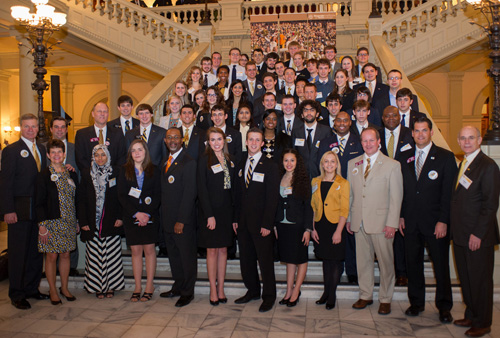
|
SPP Students Honored During Georgia Tech at the Capitol Day
(Merry Hunter Hipp, sixth from left in the front row, pictured at Georgia Tech Student Day at the Capitol. Mary Shoemaker was helping Buzz into the building when this photo was taken.)
School of Public Policy students Merry Hunter Hipp and Mary Shoemaker were among the student leaders honored in the state House and Senate Chambers during Georgia Tech Student Day at the Capitol on January 30, 2013.
Hipp was among those recognized on the floor of the House Chamber with a resolution that spoke to the students’ dedication to serving the Institute and their commitment to achieving progress.
"GT Student Day at the Capitol has always been an amazing opportunity for students to see our state government at work," said Hipp, reflecting on the experience. "In years past as an intern at the Capitol, I have been able to see what a positive influence the day and our students have on Georgia Tech's image under the Gold Dome. Now as a student coordinator of the event, I am so proud and honored to have taken part, and can't wait to see the continued mutual respect and admiration in the future between our student body and state legislature."
Shoemaker was recognized in a similar resolution sponsored in the Senate Chamber.
"GT Student Day at the Capitol was a fantastic experience because it demonstrated to our state legislators that our student body is invested in the well-being of our Institute," said Shoemaker. "By wearing our white and gold at the Capitol, we showed our GT Senators and Representatives, as well as our administration, that we do indeed have a stake in our education."
Nearly 100 students, faculty, staff, and guests traveled to the Georgia State Capitol to learn how the state government works and interact with state leaders. Read the GT Newsroom press release.
|
GTRIC Events Hosts First Special Ivan Allen College Segment
|
|
|
|
Held on February 12, 2013, at the Georgia Tech Research and Innovation Conference (GTRIC), graduate students at the Ivan Allen College of Liberal Arts participated in a special IAC component of the conference. The component consisted of special project presentation sessions and the first Ivan Allen College Paper Competition. Andrew Quitmeyer, graduate student in the Digital Media program in the School of Literature, Media, and Communication, won the Best Poster prize awarded by Campus Services at the evening ceremony capping the conference. View the poster here. Through the IAC Paper Competition, three Ivan Allen graduate students were awarded $1,500 each in travel grants to support research travel for fieldwork or to present at other conferences: - First place― Tong Zhao, PhD student in The Sam Nunn School of International Affairs, with the paper "Confidence-Building and Nuclear Arms Control between the U.S. and China: The Role and Limit of Epistemic Community."
- Second place― Emily Gibson, PhD student in the School of History, Technology, and Society, with the paper "The Hand that Rocked the Cradle Flies the Family's Plane Today: Feminism, Gender Roles, and the Rise of Commercial Aviation in the United States during the 1920s-1930s."
- Third place― Peter G. Westin, PhD student in the School of History, Technology, and Society, with the paper "Sparky, the Patriot, and Turbo-Diesels: The Relevance of Failed Motorsports Innovations in the History of Technology."
Graduate students on the IAC Graduate Student Advisory Board organized the paper conference, which was generously supported by the Dean's Office. IAC faculty members across units volunteered to evaluate the essays according to a scoring rubric developed by the students. "Overall IAC interest in GTRIC was very impressive, especially given this being the first year for the paper competition," said John H. Miller, a graduate student in the School of History, Technology, and Society. IAC graduate students presented their research in panels throughout GTRIC, while the posters were on display for faculty and graduate student judges in the Student Center ballroom. "I am glad that I attended this conference and had the wonderful opportunity not only to present my own research but to get to know the extraordinary work done by my fellow students," said Zhao, the first place winner of the paper competition. "It has been a very rewarding experience, and I learned a lot from talking with professors and fellow students on some very interesting and innovative research topics." IAC graduate students were grateful for the opportunity to present to their peers and faculty and to receive valuable feedback. Peter Westin described the IAC paper competition as "a great beginning to important cross-pollination of knowledge from multiple disciplines." |
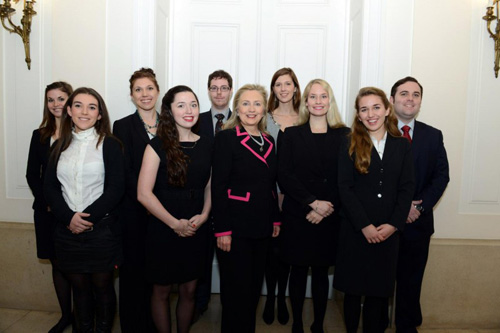
|
INTA Students Reflect on Internships with U.S. Department of State
(Jacline Griffeth, second from right, and Jeremiah Olney, back row center, pictured with former Secretary of State Hillary Clinton.)
In December, former Secretary of State Hillary Clinton made her 38th and final official visit to the U.S. Embassy and Mission to the European Union in Brussels, Belgium. Two INTA undergraduates took a moment from their internships at the State Department office for a picture.
Their roles and responsibilities:
Jacline Griffeth, a student in The Sam Nunn School of International Affairs and the School of Modern Languages, worked at the U.S. Mission to the European Union and focused on the Population, Refugee, and Migration program.
“I had the opportunity to discuss EU and U.S. policy on human trafficking with NGO and government officials and released a cable (a State Department internal report) on the EU anti-trafficking conference. I was also fortunate to work with a Foreign Service officer to gain a non-governmental perspective on EU-China relations with the overarching aim of aligning EU and U.S. policy towards China,” said Griffeth.
Jeremiah Olney, a student in The Sam Nunn School of International Affairs, worked as an intern for the US-European Media Hub office of the U.S. State Department. Each morning he drafted a report based on European media reports of ongoing news events that were then sent to State Department officials in Washington, D.C., and embassies worldwide.
Griffeth called her fall semester, “an incredible and eye-opening experience.”
|
IAC Art on Display
Two February events featured art created by students at the Ivan Allen College.
|

|
Clough Art Crawl
The second annual Clough Commons Art Crawl witnessed a record 364 submissions by 146 artists, 25 of which were artworks created by IAC students. The walls of Clough Commons became a make-shift gallery, featuring work in multiple media formats and live student performances, during the exhibition on February 8, 2013.
Submissions by students in the following IAC majors were approved for the show:
- Computational Media: 7
- Science, Technology, and Culture: 6
- International Affairs and Modern Languages: 3
- Applied Languages and Intercultural Studies: 2
- Digital Media: 2
- Human-Computer Interaction: 2
- Economics: 1
- International Affairs: 1
- Public Policy: 1
Faculty and alumni of the School of Literature, Media, and Communication were among the jurors:
- Digital Media/Film/Video: Daniel Upton, alumnus; and Christopher Weedman, Brittain Fellow
- Drawing/Painting: Mark Dennard, alumnus
- Poetry/Prose: Blake Leland, associate professor
Artwork remains on display in Clough Commons until March 15, 2013.
Related Links:
|
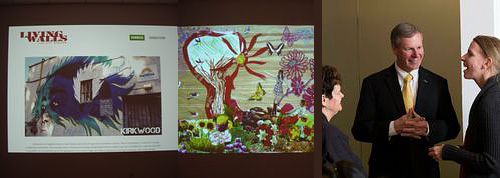
|
Georgia Tech Night at the Woodruff Arts Center
Student art work created in the Institute’s first-year writing and communication courses (English 1101/1102) and other communication-related courses in the School of Literature, Media, and Communication was featured at Georgia Tech Night at the Woodruff Arts Center on February 7, 2013.
The exhibition, organized by the Writing and Communication Program’s Arts Initiatives Committee, previewed select digital artifacts from this year’s second annual Student View exhibit, scheduled for March–April 2013. The exhibit can be seen in the main venue where a reception will take place.
For a second year the Arts Initiatives Committee and the Woodruff Arts Center have collaborated to present the exhibition, which is unique to Georgia Tech. No other school in the country exhibits student art created in Writing and Communication Program classes in a city’s premier art gallery.
Related links:
|
Highlights of Upcoming IAC Events
Save the date for these IAC-sponsored events.
|
RSVP for Founder's Day
Save the date for the Ivan Allen College of Liberal Arts Founder's Day celebration on March 13, 2013. Click here to RSVP.
This year marks the 50th anniversary of landmark acts of social courage in the arena of civil rights that forever changed the face of America and the world. We will remember those extraordinary actions by Americans ranging from Presidents Lincoln, Kennedy, and Johnson, to the courageous leaders of the civil rights movement including Martin Luther King, Jr. and Allen Prize recipient, Congressman John Lewis. The college's founding namesake, former Atlanta Mayor Ivan Allen, Jr., was one of those who stood up for civil rights. We will remember his courageous testimony before Congress on behalf of what became the Civil Rights Act of 1964. The program "From Witness to Action” will celebrate the many individuals who put their lives on the line in 1963 to advance equality for all Americans and will highlight work by our own faculty and students to advance social justice.
- 9:00 am – 12:00 pm – A Research Roundtable on Social Justice will present student and faculty research-based dialogs. Location: Gordy Room in the Wardlaw Building.
- 1:30 pm - 3:00 pm – Stephen C. Hall Building Ribbon Cutting Ceremony will showcase the newly renovated building and the Writing & Communication program that is housed there. Location: 215 Bobby Dodd Way.
- 3:30 pm - 4:30 pm - Founder's Day Program & Legacy Awards will feature a performance by DramaTech. Location: Gordy Room in the Wardlaw Building.
- 4:30 pm - 5:30 pm - Founder's Day Reception will be held in the Gordy Room in the Wardlaw Building.
Faculty, staff, students, alumni, and friends of the college are invited to attend. Click here to RSVP.
|

|
Inaugural Sports, Society, and Technology Lecture Will Explore How Technology is Changing the Way Sports are Played
Get a first look at the new Sports, Society, and Technology program at the Ivan Allen College, officially launching in April, by attending one of its first events. Former Division I athlete Sam Strickling will speak on "Making it Unfair: How Technology is Changing the Way Sports are Played" in a public lecture on March 5.
Technology is changing the way we view athletes and sports. We now have the ability to determine a runner's optimal warm-up period, measure the distance of home runs, and calculate how many more laps an athlete can complete. This blending of engineering and sports is quickly becoming one of the fastest growing research areas and is in its infancy. Grabbing a piece of the $100 billion dollar industry may require engineers to put down their calculator and put on a football helmet.
Learn more about the Sports Science field and how you can get involved at the lecture in Room 105 of the D.M. Smith Building at 3:30 pm on March 5. View the calendar entry for more information.
|
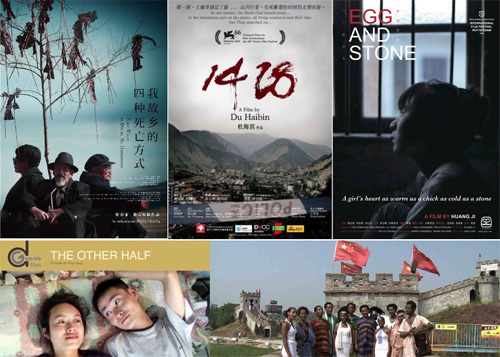
|
Independent Chinese Film Series
The Independent Chinese Film Series is a multi-campus, month-long festival that runs through March 28, 2013.
Since the early 1990s, independent filmmakers in China have presented some of the most thoughtful and thought-provoking visions on contemporary Chinese history and society. The six-film series, curated by Qi Wang, assistant professor in the School of Literature, Media, and Communication, aims to bring to students, scholars, and the general public recent representation works of this exciting cultural phenomenon.
Sponsors include the China Research Center, Georgia Tech, Emory University, Georgia State University, and Kennesaw State University. View the flyer for more information.
|
|










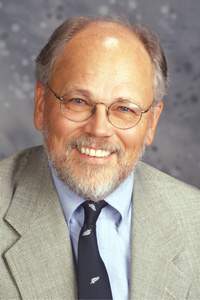
 At the recent national meeting of the Association of American Colleges and Universities, held in Atlanta in January, Usselman participated in a panel sponsored by the AHA and offered insights on the Tuning project. Usselman, chair of HTS, also examined the role of clusters and minors, which provide opportunities for non-majors to experience Ivan Allen College's unique brand of historical inquiry. In February, Usselman and Nobles will attend a workshop in Washington sponsored by the AHA. Nobles is a former HTS chair and now directs Georgia Tech’s Honors Program.
At the recent national meeting of the Association of American Colleges and Universities, held in Atlanta in January, Usselman participated in a panel sponsored by the AHA and offered insights on the Tuning project. Usselman, chair of HTS, also examined the role of clusters and minors, which provide opportunities for non-majors to experience Ivan Allen College's unique brand of historical inquiry. In February, Usselman and Nobles will attend a workshop in Washington sponsored by the AHA. Nobles is a former HTS chair and now directs Georgia Tech’s Honors Program.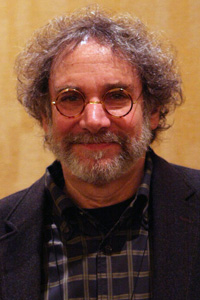
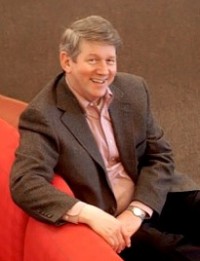
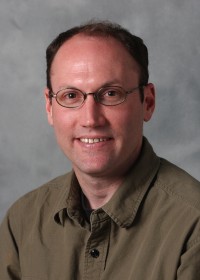

 "Election observers wear identifying vests or tshirts; carry clipboards, not weapons; and rely upon training in both social science research methods and computer science to present a final analysis of the electoral process to the host country’s government," said Lincoln of the role.
"Election observers wear identifying vests or tshirts; carry clipboards, not weapons; and rely upon training in both social science research methods and computer science to present a final analysis of the electoral process to the host country’s government," said Lincoln of the role.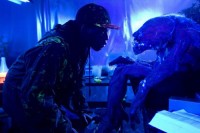
 Film screenings included work by local and international filmmakers as well as Clayton Ziga, a student studying Science, Technology, and Culture in LMC.
Film screenings included work by local and international filmmakers as well as Clayton Ziga, a student studying Science, Technology, and Culture in LMC.

